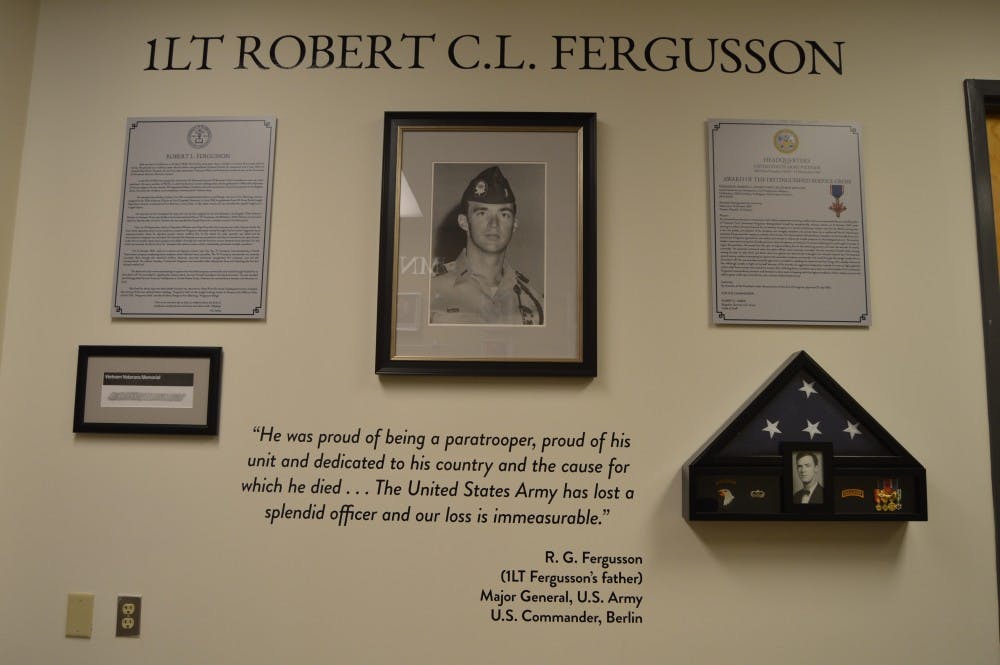Editor's note: The original version of this article and headline said Fergusson was the first gradate to ever be killed in combat. He was the first to be killed in combat during the Vietnam War.
On Nov. 8, 1967, Lt. Robert “Bob” Fergusson was the first University of Richmond graduate to die in combat during the Vietnam War. Fast forward 51 years to Nov. 8, 2018, and he became the first UR graduate to receive a dedication wall for his service.
Fergusson transferred to UR in 1964 as a junior after he completed two years at the U.S. Military Academy in West Point.
A successful scholar, Fergusson was the Cadet Commandant of the ROTC and a member of the military honor society. He was deemed a “distinguished military student” at UR, meaning he ranked in the top 20 percent of all military student cadets across the nation.
After graduating in 1966, Fergusson was stationed with the 101st Airborne Division serving in the Vietnam War.
On Oct. 8, 1967, Fergusson suffered a severe head wound caused by enemy automatic weapon fire. He had been attempting to save his commander, Capt. John Lawton, who was in the hands of the enemy. Lawton had ordered him to retreat, but Fergusson had refused. Fergusson died exactly a month later, at an army hospital at Camp Drake, Japan.
“I never saw him lose his temper," said Col. Mark Scureman, Fergusson’s roommate at West Point. "He would always say, 'This, too, shall pass. We can do this.' No doubt he was calm, cool and collected when saving his fellow soldier.”
After his death, Fergusson was awarded the Distinguished Service Cross, the second highest military honor a member of the Army can receive, for his service on Oct. 8, 1967.
“You can only earn the Distinguished Service Cross through valor in combat, in face of enemy action," said Lt. Col. Cecil Stinnie, head of military science and leadership at UR. "Lt. Fergusson was wounded but still continued to fight and then paid the ultimate sacrifice. He was more than deserving of the award.”
Fergusson was loved and respected by many, especially the graduating class of 1966 at West Point. Despite not actually graduating with the class, Fergusson held the friendships he made there close and kept in contact with his graduating class.
Of the 66 members that made up that class, 33 died. Last year, the surviving members wanted to pay tribute to their fallen brothers in a reunion that at least one member of kin from all of the fallen would attend.
They could find family members to attend the ceremony for all of the deceased, except for Fergusson. Then, by some stroke of luck and an obscure connection through the Society of the Cincinnati, the class of ‘66 found Robert A. Biggs, Fergusson’s cousin.
Enjoy what you're reading?
Signup for our newsletter
After attending the memorial at West Point, Biggs wanted to do more to honor his cousin, he said.
“I felt that [University President] Dr. [Ronald] Crutcher needed to know about Bob, so I emailed him and told him about Bob’s amazing story of heroism," Biggs said. "Without hesitation, Dr. Crutcher jumped on the opportunity.”
Crutcher connected Biggs to Stinnie. They, with help from others in the department, began planning a memorial that would take place only six months later and include a ceremony of remembrance and dedication of a wall to Fergusson in the military department at UR.
“Honoring Lt. Fergusson is to remind cadets that the leadership skills they learn here are going to resonate when they become military professionals and lead America’s sons and daughters into whatever the nation calls upon you," Stinnie said. "Lt. Fergusson is an incredible example of taking that responsibility seriously.”
The wall, located in the Millhiser Gymnasium at UR, includes a portrait of Fergusson, framed copies of his obituary, his Distinguished Service Cross award and a quote from his father after Fergusson's death.
“Lt. Fergusson showed remarkable courage and bravery all Spiders will forever be proud of," Jeffrey Legro, executive vice president and provost said.
In addition to the wall at UR, Fergusson has had buildings named after him at the Jungle Training Center in Panama, the Officers Club at Fort Ord and an artillery range at Fort Benning.
“Above anything, not only was Bob a Distinguished Service Cross award winner, but he was a Hall of Fame human,” Scureman said.
Contact senior features writer Alex Maloney at alexandra.maloney@richmond.edu.
Support independent student media
You can make a tax-deductible donation by clicking the button below, which takes you to our secure PayPal account. The page is set up to receive contributions in whatever amount you designate. We look forward to using the money we raise to further our mission of providing honest and accurate information to students, faculty, staff, alumni and others in the general public.
Donate Now


